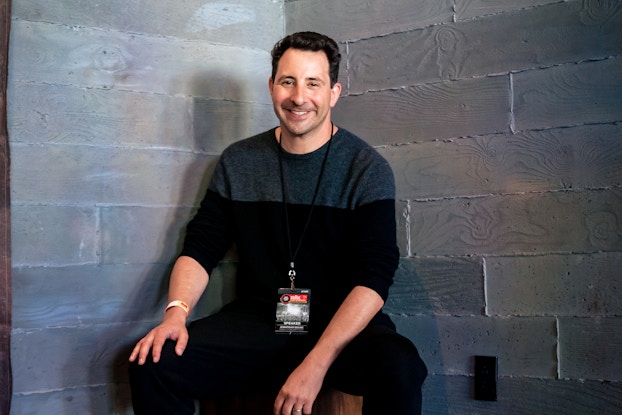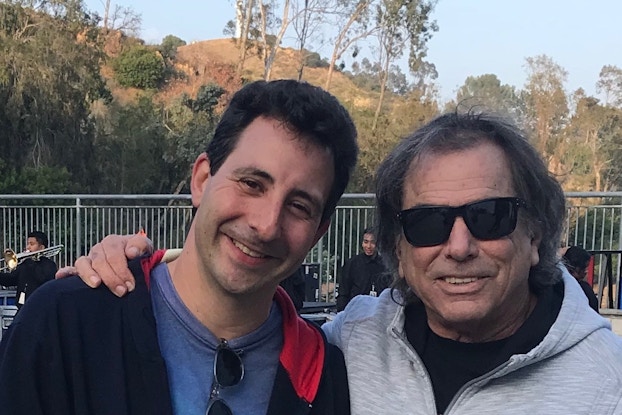
Why having a mentor is important, according to Jonathan Shank, CEO and Founder of Terrapin Station Entertainment, a division of Sony:
- There is always an opportunity to learn when you ‘remain open-minded.’
- Having a mentor gives you confidence to get to the next place you’re going.
- A mentor provides you a foundation to circle back to when challenges arise.
Jonathan Shank, CEO and Founder of Terrapin Station Entertainment, has always marched to the beat of a different drummer (literally).
His career has focused on the open- and under-served spaces in the live entertainment industry that helped him create the hugely successful, family-driven touring franchises Disney Junior Dance Party on Tour, Peppa Pig Live!, and The Fresh Beat Band Live, generating more than $80 million in gross box-office sales.

Interested in a small business membership?
Find out how the U.S. Chamber of Commerce can help your company grow and thrive in today's rapidly-evolving business environment. Connect with our team to learn how a small business membership can benefit your bottom line and help you achieve your goals.
Thanks, in part, to his Los Angeles roots, he has firmly placed himself at the unconventional intersection of artist management (American Idol alum Scarypoolparty (formerly Alejandro Aranda), actress Laura Marano), event production, immersive installations, and talent development. His obsession with music has led him to represent everyone from the Bob Marley estate to former Grateful Dead drummer Mickey Hart.
His mentor, Mickey Hart, not only left him a different person, but also helped him earn critical acclaim at the highest level. As part of his extensive work with Hart, Shank earned a Grammy Award in 2009 for his role in creating the seminal drum album “Global Drum Project.”
Shank explains to CO— how his most unlikely mentorship from a former Grateful Dead drummer has utterly redirected his life in ways he could never have imagined.
CO—: Who is your mentor and what makes him special?
JS—: It’s Mickey Hart, the former Grateful Dead drummer. Apart from his wild success with the Grateful Dead, he’s also been a solo artist, percussionist, and author of several books.
CO—: What is your mentor like?
JS—: Mickey really likes putting people on a good path and taking all the wisdom he’s learned and impacting that on others. He knows how to go very, very deep into a subject whether it’s about music, art, or the cosmos.
CO—: What have you learned from your mentor that’s been key, valuable, or even game-changing to your career?
JS—: Mickey taught me how to build a proper show and production and how to put it together piece by piece. Whether it’s how to stage a production or how to handle marketing or the way we treat the consumer fan base, the foundation is what I learned from Mickey.
[Read: Execs From PepsiCo and Macy’s to Salesforce Reveal Their Mentors’ Best Advice]
From an ethereal standpoint, he instilled fearlessness in me. That means not compromising the right way to do things. It means holding the line and making sure that things are done the right way.Jonathan Shank, CEO and Founder, Terrapin Station Entertainment
CO—: Which of your mentor’s qualities impact you most today?
JS—: Fearlessness. From an ethereal standpoint, he instilled fearlessness in me. That means not compromising the right way to do things. It means holding the line and making sure that things are done the right way.
CO—: How did your relationship with your mentor evolve?
JS—: I met Mickey in 2004 when I had just begun managing musical artists. He took a chance on me and gave me the opportunity to work together. Our meeting became a collaboration on a project and then it evolved into all the projects he was working on. He opened my eyes to not just being a manager, but to gaining the skill sets to producing shows and tours.
CO—: Do you continue to see him?
JS—: I’m meeting with him today. We’re in constant contact. Sure, we both have our own families and our own lives, but we often connect personally.
CO—: What was your craziest time with your mentor?
JS—: When we went to (former CBS News anchor) Walter Cronkite’s apartment in New York City near the United Nations buildings. Mickey and Walter were close friends. Walter asked Mickey to come by and I happened to be with him. We brought drums and jammed in Walter’s apartment. Walter used to play drums, too.
CO—: Can you show us your mentor’s imprint in action?
JS—: His imprint is on everything I do. For example, we just announced a new Disney Jr. Live tour today, and what I learned from him is to focus and not just take the tour to random places. The strategy — much like the Grateful Dead’s — is to always go where the audience is. That’s what Mickey and Grateful Dead were masters of: not just how to find and build a core audience but how to arrange the tours and the marketing around that.
CO—: Is there a recent project you’re working on that reflects your mentor’s imprint?
JS—: I just started a podcast called “The Jam” and a lot of the guests and stories relate back to Mickey. The whole reason I wanted to do the podcast was — like Mickey — to lift up unknown artists and their unknown stories. That’s something I’ve learned from Mickey that he’s done his entire career. He dedicated his life to helping musicians globally.
[Read: Execs From Hershey’s to Microsoft Reveal Their Mentors’ Best Advice]

CO—: Can you explain, by example, how your mentor’s influence taught you to collaborate?
JS—: Mickey collaborates with so many artists. He really embodies the spirit of collaboration and that opens relationships to other artists. For me, it’s also opened relationships that I carry forward today. I’m working on a new YouTube channel project called “Gracie’s Corner” that collaborates with different artists, just like Mickey would. His handprints are all over it.
CO—: Please finish this sentence: Had I not met my mentor, I would never have…
JS—: Had I not met Mickey, I would likely never have produced concert tours. I guess I’d just be managing artists or trying to find my way around in the music business.
CO—: What are the three most important lessons that you’ve learned from your mentor?
JS—: Remain open-minded; remember, there is a path for everyone; hold the line; [and] don’t cut corners.
CO—: Are you a mentor?
JS—: I’ve mentored several interns and continue to mentor at colleges.
CO—: What did you learn from your mentor that you never expected to learn?
JS—: I’ve learned a lot about rhythm. Rhythm is the most basic beat in life. Your first introduction to rhythm is your heartbeat. You need to live in rhythm your entire life. But a lot of people get away from that basic foundation. You need to enter life every day and carry that rhythm with you. That is the benchmark of the way I try to live positively every day. I live in rhythm.
CO—: You must have one personal Grateful Dead story that you’re dying to share, no?
JS—: I saw the Grateful Dead perform 50-plus times with Jerry Garcia. I saw them the very last time they performed their seminal jam vehicle, “Dark Star.” It was at the [former] Omni Coliseum in Atlanta on March 30, 1994. They changed their set list after that and never repeated it again. I was there.
CO— aims to bring you inspiration from leading respected experts. However, before making any business decision, you should consult a professional who can advise you based on your individual situation.
CO—is committed to helping you start, run and grow your small business. Learn more about the benefits of small business membership in the U.S. Chamber of Commerce, here.







